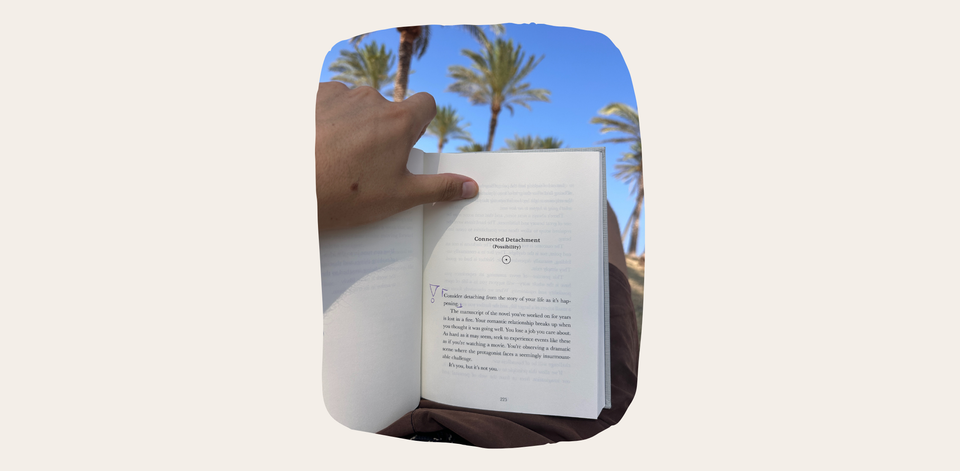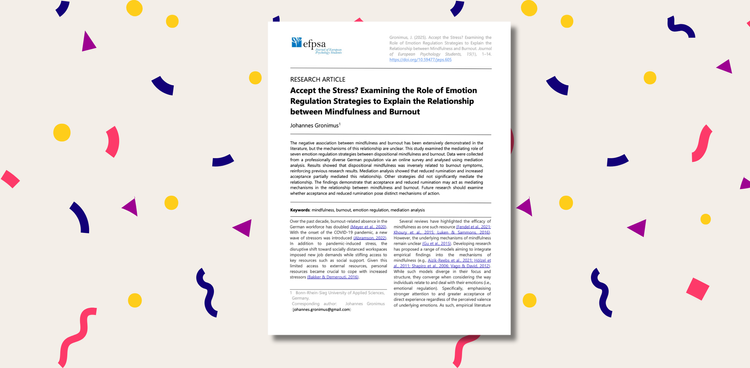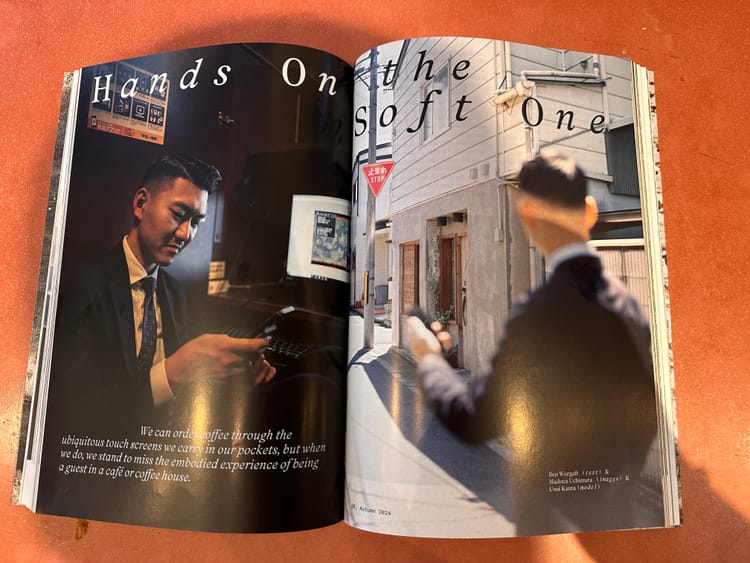The Outcome is Not the Outcome

"The outcome is not the outcome. The darkness is not an end point, nor is the daylight. They live in a continually unfolding, mutually dependent daylight cycle. " - Rick Rubin
We all share this lovely little delusion that we're basically "finished". That whatever came in our lives until now is what formed us, and what comes now is us living out the result. As if yesterday was the moment that we finally became the person we're gonna be for the rest of our lives.
My favourite example of this is the phrase "in the end": There's a beautiful arrogance in claiming that "in the end, things turned out for the best" (or, of course, the opposite) - as if the end were already reached?
As far as I'm aware, the end is death, and as long as I'm still breathing, what might feel like "the end" is simply me pressing the pause button in the middle of watching a movie. Taking a screenshot in the middle of a movie and concluding anything about its end is a bit silly, isn't it?
Well, if that is true, I'm a silly goose, and so are you. All of us guilty of what the research calls the "end of history" illusion. In experience, it shows up as that faulty feeling that "from here on out, I'm surely gonna change - just not as dramatically as before". In data, it manifests in our tendency to a) drastically underestimate the magnitude future changes and b) drastically overemphasise the importance of current events. And this has real consequences - both for our experience and for our decision-making.
Now, as a matter of sanity, this makes perfect sense: Most of us believe our values to be admirable, our personalities endearing and our preferences wise. Of course we do: Otherwise we wouldn't hold them to be our values and preferences. So naturally, entertaining the possibility of diverging from these wonderful qualities might cause some reluctance. What's more, we tend to be convinced that we know ourselves well - and the fact that we might not even recognise a future version of ourselves can be pretty damn scary.
And so we go through our lives, day by day convinced that today is the day that we're done. That the big metamorphosis that was the last 10 years is now completed, we've come out the other end a wonderful butterfly, and this butterfly is now gonna butterfly into the sunset (or something like that). But as you can probably imagine from the fact that it's titled an "illusion", this is horribly wrong. At least if you're under the age of 68:

Quoidbach et al. (2013) had over 8000 people describe how much their personality, values and preferences had changed over the last 10 years, and how much they'd predict they would change over the next 10 years. Comparing the two, they found that:
"For groups spanning 18 to 68 years of age, people of all ages described more change in the past 10 years than they would have predicted 10 years ago."
No matter if you're just stumbling out of high school or just about stumbling into retirement, you will underestimate the changes that the next 10 years will bring. Add to this all the other funky features of the mind - like the tendency to overestimate the lasting impact that unwanted events will have on our well-being (Hello Impact Bias), and in contrast the delusion that if we only get that one thing we're currently looking for, we'll be lastingly happy (Hello Arrival Fallacy) - and you have a lovely recipe for dread.
"The outcome is not the outcome. The darkness is not an end point, nor is the daylight. They live in a continually unfolding, mutually dependent daylight cycle. " - Rick Rubin
Put simply, we chronically underestimate our ability to adapt to things - both negative and positive - and the impact that these adaptations will have on us as human beings. And it's this chronic underestimation of our inherent power (Dan Gilbert calls it the "psychological immune system") that leaves us overly worried about events we have no business worrying about, all stressed and fragile.
But let's make this practical. Ever since I came back to Europe in April, I've been racking my brains around the next chapter. To go back to Australia, or to settle somewhere here? And once I've figured that out - what the hell do I do there (or here, for that matter)? I've lost countless nights of sleep, rolling around from left to right 'til 6am trying to figure out that haunting question: "What the fuck am I gonna be doing with my life?" Or, in case I found a prospective answer, rolling around from left to right 'til 6am finding all its potential flaws.
Not a great feeling, nor a good use of a night when you wake up the next day tired, exhausted and annoyed. But: It seems to be the season for it. Speaking to my friends, it turns out I'm not the only one losing sleep over this right now. My dear friend Flo put it wonderfully:
I guess this is the time where we lose the delusion we had when we were 18: That you choose a thing and then just stick to it forever.
Funny enough, I distinctly remember the ease with which I made my decision back then. At 17, I went to a lecture in Business Psychology and I thought it was incredibly fascinating. So I applied to that course, and that course only, and went on with my life. Didn't I have it figured out back then. By contrast, this year had me reluctantly putting my pillow over my head at 5am just wishing to find a way to turn of that annoying mind of mine. All because I still hadn't shaken that 18yo delusion. Welcome to another episode of THE DECISION.
"The decision" is what my mate Sam calls these crossroads that feel like they're all-determining, irrevocable and eternally binding. Only, as he pointed out so wonderfully last year (when I wrote about this first), these moments tend to come pretty frequently when you're in your twenties. Last year, he tried to take away my anxiety by listing all the "the decisions" he had made in the last few years, how "ultimate" they'd felt every time, and how little he thinks about them now. Why?
"The outcome is not the outcome. The darkness is not an end point, nor is the daylight. They live in a continually unfolding, mutually dependent daylight cycle. " - Rick Rubin
It's almost hilarious: I've probably made at least three "the decisions" this year. Yet I never learn my lesson: History ain't over. Sure, all of them are going to have a lasting impact on this funky journey I'm on, but none of them is gonna be the ultimate determinant of my life. Every single time, it feels that way. But every single time, it's an illusion:
Yesterday's output is simply today's input - nothing more, nothing less.
So what does recognising this mean in practice? Well, I've found it comes down to two possible stances, two ways of meeting the world. Real-Life Example:
The central determinant of my life's chapter is APS assessment. It's the Australian Psychological Society telling me if my degree is worth anything over there. In my stressed & sleepless state, this meant the following: My destiny is in the hands of the APS. If they don't recognise the degree, it'll ruin my trajectory and I'll be sad forever (Impact Bias). But if they do, I'll go back and life will be wonderful (Arrival Fallacy).
Understandably, seeing the world like this is profoundly stressful. Exhausted from months of trying to find the "right" decision (that will apparently govern the rest of my life) and then finding a pathway that feels just right is the perfect recipe for fixation. For that one specific outcome, the one that promises relief. And all exhausted from the sleepless nights, the best thing I could muster up was hope.
Only to hope is, at least to a degree, to resign. Or at least that's what it felt like. It's a passive stance: Hoping for things to just happen to fall into place just as I'd like them. To simply decide to hope can provide some well-needed peace in the depths of exhaustion. But it doesn't have to be the end of the path.
A few days of hoping (and recovering) later, I could feel a change. Recognising all the biases that combine into this fixation, I can take a different stance. Rigid fixation makes you frail and brittle - one "false" outcome and everything is ruined. But recognising the biases at play here, I found some open curiosity & flexibility again. In reality, the outcome (of the APS assessment) is not the outcome (of my life). It's a screenshot in the middle of a movie. And I was out here once again underestimating my figureoutability. My psychological immune system.
Standing at the foot of the path with nothing but hope for one specific outcome, I felt fragile as hell. After all, if the outcome is the outcome, everything is riding on this. But with a calm recognition that history ain't over, I can give up hope and start putting trust into my ability to wiggle and weave around whatever comes. Marked by proactivity and a joyful anticipation, this not only feels more adaptive (as in, closer to reality than my biased delusion), but also more empowering.
"The outcome is not the outcome. The darkness is not an end point, nor is the daylight. They live in a continually unfolding, mutually dependent daylight cycle. " - Rick Rubin
Lastly, I also wanna point to the daylight part. Sure, "The outcome is not the outcome" is great to understand in the context of the Impact Bias: "It's not that deep, so chill" is the TLDR of the past 1500 words. But of course, "The outcome is not the outcome" relates symmetrically to the Arrival Fallacy. The fact is that even if I get everything I could hope for, I'll be in Australia in February and (with 100% human guarantee) I'll find new things to worry about.
In the end, which one's gonna be the "right" path? I'll have to wait 'til the end to figure that out. To quote a little Kierkegaard: "Life is lived forwards and understood backwards." So until I get to understand backwards, none of it is the outcome. Just another chapter in the story that lays the groundwork for the next. And I believe there’s some peace in that for those that think they need to have it all figured out right about now.





Comments ()